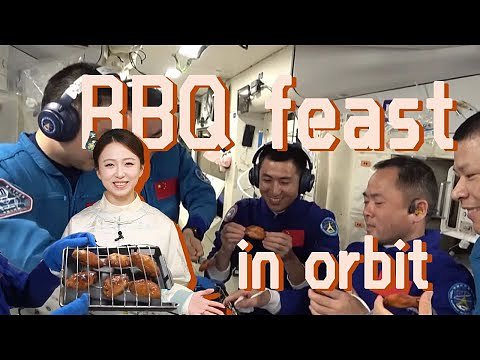
China's Space Station: BBQ in Orbit Signals Ambitious Push for Long-Duration Missions
China's Tiangong space station just got a gourmet upgrade. A new hot air oven is part of a broader push for long-duration missions and ambitious scientific research, including the first-ever rodent study in orbit.
China's Space Station: BBQ in Orbit Signals Ambitious Push for Long-Duration Missions
Beijing – A whiff of roasted chicken wing is reportedly permeating the Tiangong space station this week, a testament to China’s evolving ambitions in space. The crew of the Shenzhou-21 mission recently conducted a historic “space BBQ” using a newly delivered hot air oven, a symbolic and practical step toward enabling comfortable and sustainable long-duration space habitation. Beyond the culinary milestone, the mission represents a concerted effort to expand China’s scientific capabilities in orbit, focusing particularly on the impacts of long-term spaceflight on biological systems.
A Culinary Leap Forward
The ability to cook fresh food in space, rather than relying solely on pre-packaged or freeze-dried options, may seem like a minor detail. However, experts suggest it represents a significant improvement in the quality of life for astronauts embarking on extended missions. “Nutrition and morale are critically linked,” explains a space food specialist. “Having access to a broader range of food choices, and the ability to prepare them in a way that feels more familiar, can have a profound impact on astronaut wellbeing.”
The oven, capable of reaching 190°C, utilizes a catalytic filtration system to eliminate odors and ensure compliance with station safety standards. This technology builds upon previous attempts at in-space baking on the International Space Station, offering a broader range of cooking capabilities. The upgrade moves China’s program beyond simple reheating, signaling a commitment to creating a comfortable living environment for astronauts during long-duration missions, potentially exceeding a year.
Pioneering Space Biology: Rodents in Orbit
Beyond the culinary enhancements, the Shenzhou-21 mission is conducting groundbreaking research with a unique cohort of passengers: four mice. This is China’s first in-orbit study involving mammals, aiming to understand how the space environment impacts physiological and behavioral processes.
“Studying mammals in space is a crucial step toward understanding the long-term effects of microgravity on complex organisms,” explains a researcher familiar with the project. “Mice provide a valuable model due to their genetic similarity to humans, allowing us to extrapolate findings and assess potential risks for future deep-space missions.”
The mice are being monitored closely, with researchers tracking their activity, stress levels, and organ function. The goal is to identify potential countermeasures to mitigate the negative effects of spaceflight, such as bone loss, muscle atrophy, and immune dysfunction. The samples gathered from the mice during and after the mission will provide invaluable data for future studies.
China’s Strategic Push in Space
The Shenzhou-21 mission is emblematic of China’s broader ambition to become a leading space power. Driven by a centrally planned and aggressively funded program, China is rapidly expanding its capabilities in areas such as crewed spaceflight, lunar exploration, and deep-space research.
“China views space as a key strategic frontier,” states a defense analyst. “They are investing heavily in space technology not only for scientific discovery but also to enhance their national security and global influence.”
The Tiangong space station, continuously occupied since June 2021, is central to China’s long-term space strategy. The station is designed to be a permanent research platform and a stepping stone for future missions to the Moon and Mars. China is also actively seeking international collaborations, opening up opportunities for other nations to participate in research on Tiangong.
Competition and Collaboration
The rise of China’s space program has intensified the competition with the United States, the traditional leader in space exploration. While competition is fierce, there are also areas of potential collaboration. Experts believe that cooperation on issues such as space debris mitigation and planetary defense is essential for the long-term sustainability of space exploration.
“The challenges of space exploration are too great for any one nation to address alone,” states a space policy expert. “International collaboration is essential to maximize resources and accelerate scientific discovery.”
However, certain political factors continue to hinder full collaboration. The US Wolf Amendment restricts direct space collaboration with China, limiting opportunities for joint missions and research projects. Despite these challenges, analysts suggest that a pragmatic approach to cooperation could benefit both nations and the global space community.
Looking Ahead
The Shenzhou-21 mission represents a significant milestone in China’s space journey. The combination of technological innovation, scientific research, and ambitious long-term goals positions China as a major player in the global space arena.
“China is determined to achieve its space ambitions,” concludes a researcher familiar with the program. “They are investing heavily in the infrastructure, technology, and human capital necessary to become a leading space power. The recent developments demonstrate that the program is on track to achieve these ambitious goals.”
The ongoing research on Tiangong, coupled with China’s plans for lunar exploration and deep-space missions, promises to unlock new frontiers in space science and technology. As China continues to push the boundaries of space exploration, the world will be watching with keen interest.
